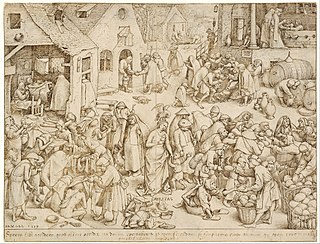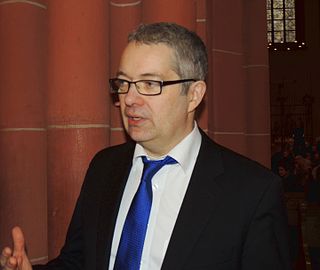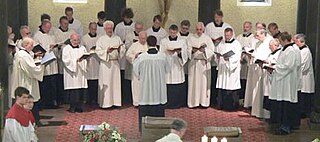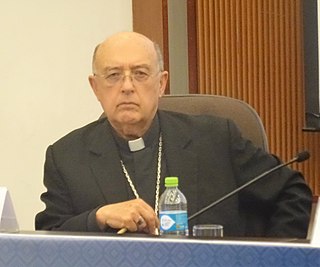An oratorio is a large musical composition for orchestra, choir, and soloists. Like most operas, an oratorio includes the use of a choir, soloists, an instrumental ensemble, various distinguishable characters, and arias. However, opera is musical theatre, while oratorio is strictly a concert piece – though oratorios are sometimes staged as operas, and operas are sometimes presented in concert form. In an oratorio the choir often plays a central role, and there is generally little or no interaction between the characters, and no props or elaborate costumes. A particularly important difference is in the typical subject matter of the text. Opera tends to deal with history and mythology, including age-old devices of romance, deception, and murder, whereas the plot of an oratorio often deals with sacred topics, making it appropriate for performance in the church. Protestant composers took their stories from the Bible, while Catholic composers looked to the lives of saints, as well as to Biblical topics. Oratorios became extremely popular in early 17th-century Italy partly because of the success of opera and the Catholic Church's prohibition of spectacles during Lent. Oratorios became the main choice of music during that period for opera audiences.
CAFOD is the Catholic Agency for Overseas Development. It is an international development charity and the official aid agency of the Catholic Church in England and Wales. It stands beside people living in poverty – whatever their religion or culture. Through local Catholic Church and secular partners, it helps people directly in their own communities and campaigns for global justice, so that everyone can reach their full potential.
Catholic social teaching is the Catholic doctrines on matters of human dignity and common good in society. The ideas address oppression, the role of the state, subsidiarity, social organization, concern for social justice, and issues of wealth distribution. Its foundations are widely considered to have been laid by Pope Leo XIII's 1891 encyclical letter Rerum novarum, which advocated economic distributism. Its roots can be traced to the writings of Catholic thinkers such as Thomas Aquinas and Augustine of Hippo, and is also derived from concepts present in the Bible and the cultures of the ancient Near East.

Works of mercy are practices considered meritorious in Christian ethics.

Sir Fazle Hasan Abed was the founder of BRAC, one of the world's largest non-governmental organizations.
Tarantino, spoken in the southeastern Italian region of Apulia, is a transitional language, most of whose speakers live in the Apulian city of Taranto. The dialect is also spoken by a few Italian immigrants in the United States, especially in California.

Clare of Assisi is an Italian saint and one of the first followers of Francis of Assisi. She founded the Order of Poor Ladies, a monastic religious order for women in the Franciscan tradition, and wrote their Rule of Life, the first set of monastic guidelines known to have been written by a woman. Following her death, the order she founded was renamed in her honour as the Order of Saint Clare, commonly referred to today as the Poor Clares. Her feast day is on 11 August.
Sandro Magister is an Italian journalist who writes for the magazine L'espresso.

Le Laudi, Op. 25, is an oratorio by the Swiss composer Hermann Suter. The full title is Le Laudi di San Francesco d'Assisi . The text is Francis of Assisi's Canticle of the Sun in the original Italian. Suter scored the work for soloists, choir, children's choir, organ and large orchestra. It was premiered in 1924, with the composer conducting the Basler Gesangverein on the occasion of its centenary. The oratorio of around 70 minutes is one of Suter's most important works and has been championed by conductors such as Wilhelm Furtwängler, who conducted the first performance in Vienna in 1926 and further performances in Europe. Although now performed relatively rarely elsewhere, it has been presented regularly in Switzerland. It was also recorded in 1991 and 2007.
Evangelii gaudium is a 2013 apostolic exhortation by Pope Francis. In its opening paragraph, Pope Francis urged the entire Church "to embark on a new chapter of evangelism". According to the exhortation, the Church must understand itself as a "community of missionary disciples", who are "permanently in a state of mission". It has been described as "the manifesto of Francis" and a "Magna Carta for church reform."
Ali al-Khawas was a prominent 9th century Muslim Sufi poet and mystic.
Laudato si' is the second encyclical of Pope Francis. The encyclical has the subtitle "on care for our common home". In it, the pope critiques consumerism and irresponsible development, laments environmental degradation and global warming, and calls all people of the world to take "swift and unified global action."

Peter Reulein is a German composer, organ improviser, academic teacher and church musician, from 2000 at the church Liebfrauen in Frankfurt am Main. In 2016 he composed for the Catholic Diocese of Limburg the Franciscan oratorio Laudato si'.

Helmut Schlegel OFM is a German Franciscan, Catholic priest, meditation instructor, author, librettist and songwriter. He is known for new spiritual songs, set by various composers.

Laudato si' is an oratorio composed in 2016 by Peter Reulein on a libretto by Helmut Schlegel. Subtitled Ein franziskanisches Magnificat, it includes the full Latin text of the Magnificat, expanded by writings of Clare of Assisi, Francis of Assisi and Pope Francis. The composer set it for five soloists, children's choir, Choralschola, mixed choir, symphony orchestra and organ. It was published in 2016 by the Dehm Verlag, and was premiered on 6 November 2016 at the Limburg Cathedral, conducted by the composer.

A Choralschola, known simply as schola, is a choir for singing Gregorian chant or plainsong. It consists traditionally of only men, but more recent groups sometimes also include female voices. A schola often performs in uniform. The group may perform in the liturgy of church services, but some specialized ensembles also perform concerts and recordings, such as the Choralschola der Wiener Hofburgkapelle and the Schola Gregoriana Pragensis.

"Glauben können wie du" is a Christian poem by Helmut Schlegel, written in 2009, and made a hymn of the genre Neues Geistliches Lied with a melody by Joachim Raabe the same year. It addresses Mary, the mother of Jesus, to be imitated living the theological virtues of faith, hope and love. The song is included in song books and the Catholic hymnal Gotteslob.
The Synod of Bishops for the Pan-Amazon region, commonly referred to as the Amazon synod, met in Rome from 6 to 27 October 2019. Pope Francis announced on 15 October 2017 that a special assembly of the Synod of Bishops would work "to identify new paths for the evangelization of God's people in that region", specifically the indigenous peoples who are "often forgotten and without the prospect of a serene future".

Johannes Hill is a German baritone in concert and in oratorios, who has performed internationally. Singing in choirs from age 10, he has performed major roles in oratorios, such as both Jesus and Pilate in Bach's Passions, and Pope Francis in the premiere of Laudato si'. He has also performed in vocal ensembles such as Kammerchor Stuttgart and Collegium Vocale Gent.

Pedro Ricardo Barreto Jimeno is a Peruvian prelate of the Catholic Church who has been Archbishop of Huancayo since 2004 and a cardinal since 2018.









